Despite all the doom and gloom out there, there has never been a better time to retire.
I know that sounds absurd, but it’s true, especially if you plan to retire on dividends alone. With the 2022 crash crushing stock prices—and driving up dividend yields—it’s prime time to grab some outsized payouts for cheap!
But the blue chips that everyone buys are not the answer. Because even with the selloff, the average S&P 500 stock’s yield has risen to … 1.6%.
No way that’ll cut it, and Treasuries won’t cut it, either. Buying the 10-year at the current 3.8% yield only gets you $19K a year in dividends on your $500K—poverty-level income.
That’s why we need real yields, not the “pretend payouts” most people settle for.
Which is where my $500K retirement strategy comes in. The beauty of this approach is that it’s scalable. Got $1 million? No problem: your $5,000 a month jumps to $10,000. And on it goes.
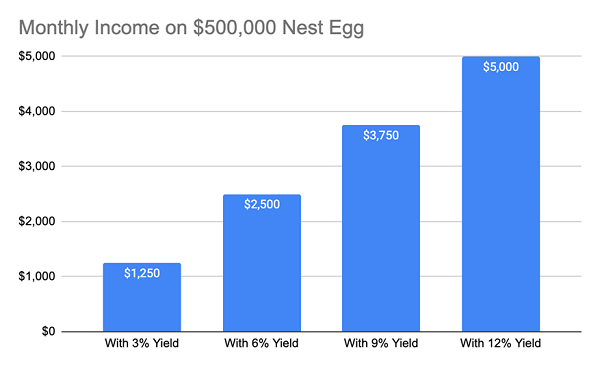
Source: CEF Insider
The “secret” here is simple: skip the blue-chip misers and go with closed-end funds (CEFs), which boast higher yields than you’ll find pretty well anywhere else. We’ll tap a three-CEF “mini-portfolio” below that delivers on that $500K retirement promise.
Moreover, CEFs—including the three below—hold stocks you probably own already, so you don’t even have to switch investments to get these big payouts!
A Rare CEF Sale, Thanks to the Fed
I’ve been writing about CEFs for nearly a decade and investing in them for much longer, and I can say that their income and gain potential look better today than they have at any other time in my investment career.
Good news on inflation has caused markets to soar, but most assets, including CEFs, are still oversold. Just look at what’s happened to stocks, bonds and real estate in the last year.
The Everything Bear Market
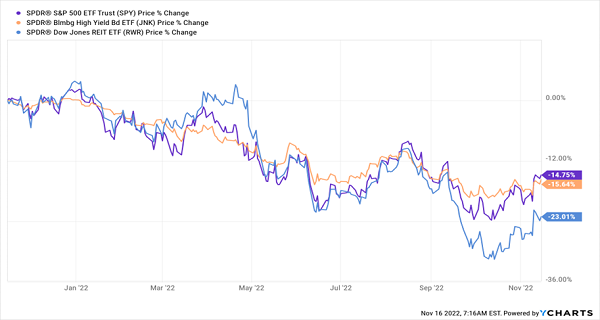
This is weird. In fact, a bear market in all three asset classes hasn’t happened since 2008. So essentially the market is predicting a bigger recession than we saw back then.
But we’re in a very different place today. Now, unlike then, banks are fine, having reported higher profits as rising rates fattened their margins. Moreover, we’re not seeing evidence of mass layoffs, mass foreclosures or other signs of long-term malaise. This is why a late-year recovery has boosted stocks 10% from their 2022 lows as of this writing, with more gains likely ahead.
Yields to the Stars—Without the Moonshot Risks
As prices rise, however, current yields on stocks and CEFs will fall. That’s why it’s important to buy now.
So let’s dig into those three CEFs I mentioned earlier, which instantly get you a diversified, high-yield portfolio that turns $500K into $5,000 in monthly dividends, with strong upside potential on top of that.
1. Blink and You’ll Miss This 11% Payout
Long-time readers will recognize the BlackRock Innovation & Growth Trust (NYSE:BIGZ) because we’ve discussed it repeatedly in 2022. It’s a relatively new fund, run by the world’s largest investment firm (BlackRockhas $10 trillion in assets).
A recovery in tech (thanks to weaker inflation) and a solid portfolio of fast-growing firms like Monolithic Power Systems (NASDAQ:MPWR), Bio-Techne (NASDAQ:TECH) and Paylocity (NASDAQ:PCTY) have tempted CEF investors to take a closer look at BIGZ. So has the discount to net asset value (NAV, or the value of the stocks it holds).
BIGZ’s Discount Looks Like It’s Bottomed
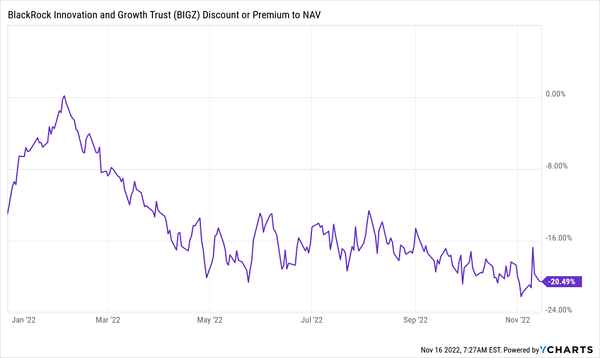
BIGZ’s 20.4% discount highlights the fund’s potential in a couple of ways. On the income side, it means the fund’s 11.4% yield can be covered by earning just a 9.1% return on NAV (because the 11.4% yield is calculated on the discounted market price, while the 9.1% figure is based on the fund’s per-share NAV).
Since the tech sector has nearly doubled that 9.1% yield on NAV, with a 17.5% annualized over the last decade, BIGZ’s dividend looks very sustainable.
But that 20%-off deal won’t last forever. Note that before 2022’s selloff, BIGZ briefly traded at par—not unlike BlackRock’s other tech funds, which have traded at high premiums for much of their lives. If BIGZ goes back to trading at par, shareholders who wait to buy will get a 9.1% yield on market price. While that’s just as sustainable as the current 11.4% yield, the reason for buying now is obvious.
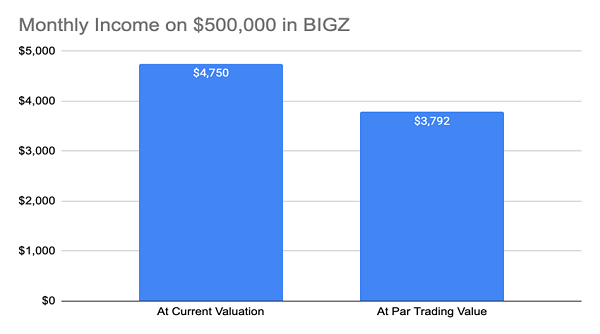
Source: CEF Insider
Even setting aside the potential gain you’d miss by waiting, the chart above shows how delaying your BIGZ purchase by just a short time could cut your income by nearly $1,000 a month! Charts like this show why income traders love bear markets.
2. An “Ironclad” 12.5% Yield From the Best Bonds
Our second CEF is the Eaton Vance Limited-Duration Income Fund (NYSE:EVV), which balances debt from higher-risk (and thus higher-yielding) firms with lower-risk shorter-term debt. This strategy has helped EVV sustain its dividend, which yields 12.5% now.
Solid Income Through a Tough Market
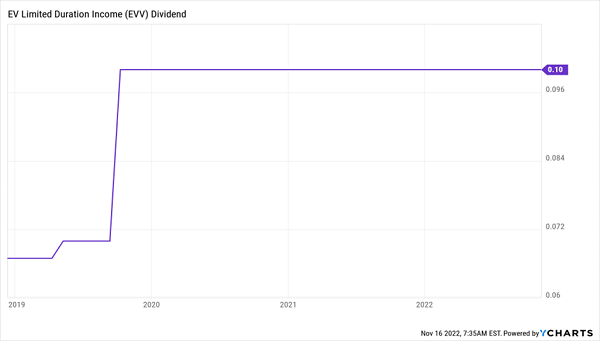
The pandemic, and slashing of rates to near zero, cut the income EVV earned from its portfolio. Yet management kept payouts steady, putting EVV in a much better position to sustain its dividend now.
This is a big deal because EVV’s 7.9% discount also makes for a more sustainable yield. As a result of that markdown, EVV’s 12.5% yield on market price is just an 11.5% yield on NAV. While that sounds high, the Fed’s moves have caused yields to soar in the high-yield corporate bond market.
Rising Yields = More Reliable EVV Payouts
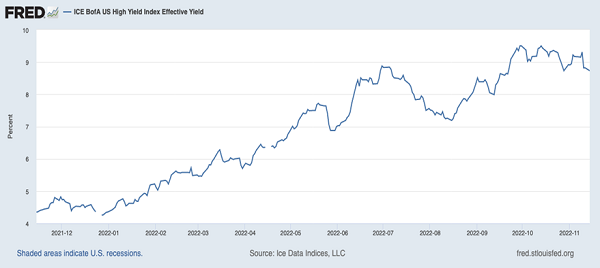
With an average 8.7% yield on high-yield debt at the moment, EVV can simply match the broader market’s returns and come near to sustaining its payouts. But since EVV has crushed the market, it’s likely to do much better than that.
EVV Demolishes the High-Yield Index
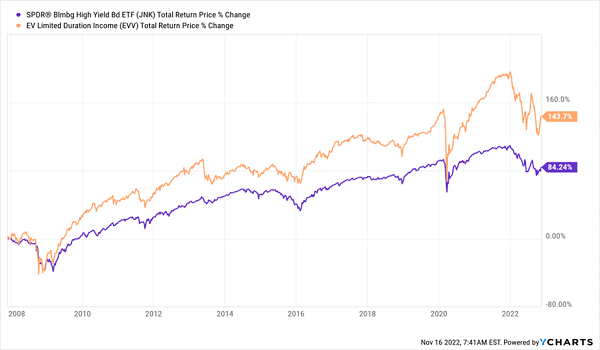
With a reliable 12.5% income stream and higher payout potential, EVV’s discount is not long for this world. We can already see its next big upward shift taking shape.
EVV’s Big Discount Sale Is in Its Final Days
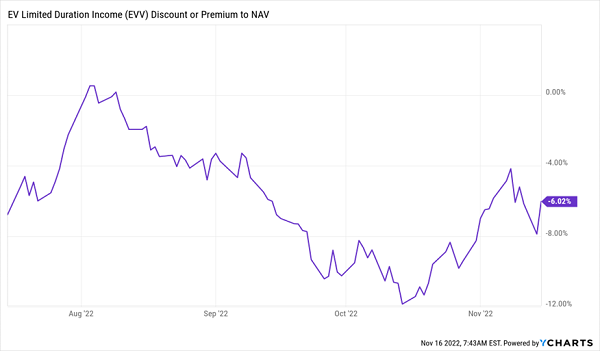
That closing discount also means we can expect higher capital gains, as EVV traded at par as recently as August.
3. An 11.8% Payer With a Discount on Borrowed Time
Let’s round off our mini-portfolio with the Aberdeen Global Premier Properties Fund (NYSE:AWP), which yields 11.8% and holds high-quality real estate investment trusts (REITs) like warehouse owner Prologis (NYSE:PLD),self-storage REIT Public Storage (NYSE:PSA) and mall landlord Realty Income (NYSE:O).
In the last few weeks, we’ve also seen AWP’s discount slowly gain ground.
AWP’s Shrinking Discount Signals a Bounce
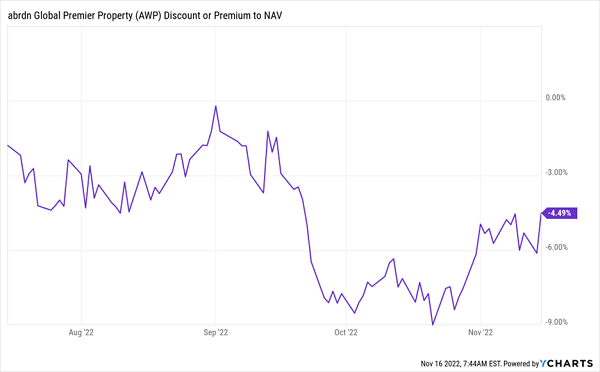
A recovery to the fund’s previous norm of a 2% discount seems likely in the coming months, providing potential upside to go along with its 12% yield.
Combine AWP with the other two funds above and you get exposure to global real estate, high-yield corporate bonds and cutting-edge tech. That’s a very high level of diversification that cuts your risk while you collect our mini-portfolio’s 12% dividend.
Disclosure: Brett Owens and Michael Foster are contrarian income investors who look for undervalued stocks/funds across the U.S. markets. Click here to learn how to profit from their strategies in the latest report, "7 Great Dividend Growth Stocks for a Secure Retirement."
